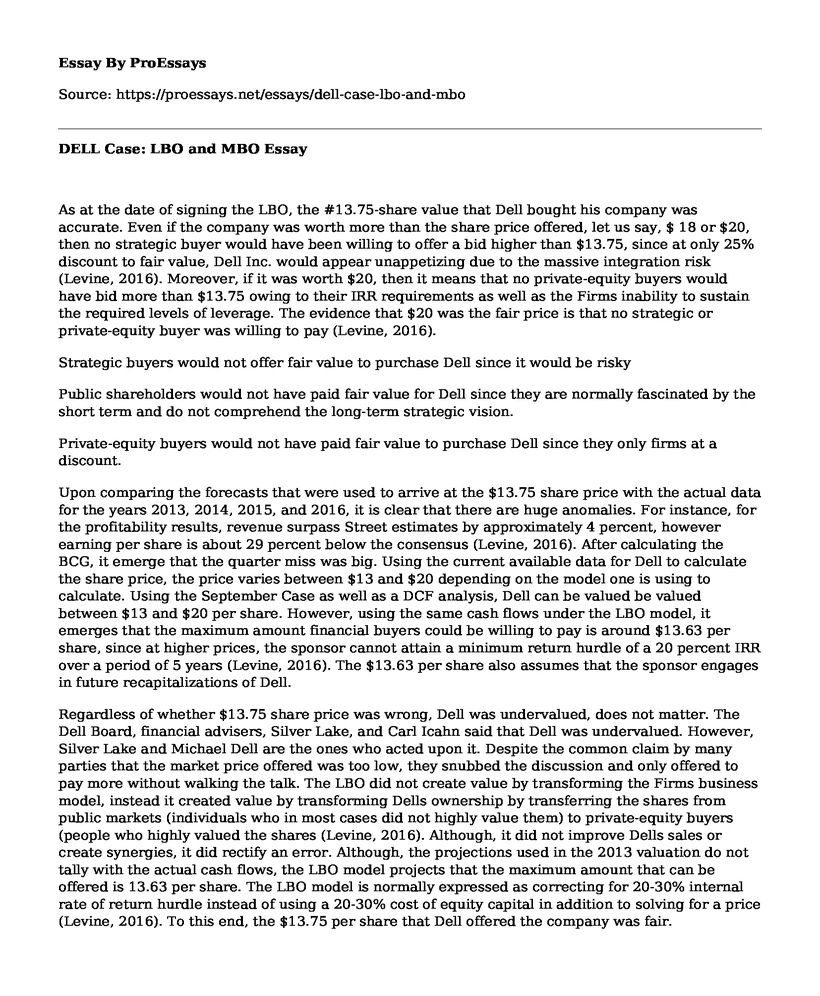As at the date of signing the LBO, the #13.75-share value that Dell bought his company was accurate. Even if the company was worth more than the share price offered, let us say, $ 18 or $20, then no strategic buyer would have been willing to offer a bid higher than $13.75, since at only 25% discount to fair value, Dell Inc. would appear unappetizing due to the massive integration risk (Levine, 2016). Moreover, if it was worth $20, then it means that no private-equity buyers would have bid more than $13.75 owing to their IRR requirements as well as the Firms inability to sustain the required levels of leverage. The evidence that $20 was the fair price is that no strategic or private-equity buyer was willing to pay (Levine, 2016).
Strategic buyers would not offer fair value to purchase Dell since it would be risky
Public shareholders would not have paid fair value for Dell since they are normally fascinated by the short term and do not comprehend the long-term strategic vision.
Private-equity buyers would not have paid fair value to purchase Dell since they only firms at a discount.
Upon comparing the forecasts that were used to arrive at the $13.75 share price with the actual data for the years 2013, 2014, 2015, and 2016, it is clear that there are huge anomalies. For instance, for the profitability results, revenue surpass Street estimates by approximately 4 percent, however earning per share is about 29 percent below the consensus (Levine, 2016). After calculating the BCG, it emerge that the quarter miss was big. Using the current available data for Dell to calculate the share price, the price varies between $13 and $20 depending on the model one is using to calculate. Using the September Case as well as a DCF analysis, Dell can be valued be valued between $13 and $20 per share. However, using the same cash flows under the LBO model, it emerges that the maximum amount financial buyers could be willing to pay is around $13.63 per share, since at higher prices, the sponsor cannot attain a minimum return hurdle of a 20 percent IRR over a period of 5 years (Levine, 2016). The $13.63 per share also assumes that the sponsor engages in future recapitalizations of Dell.
Regardless of whether $13.75 share price was wrong, Dell was undervalued, does not matter. The Dell Board, financial advisers, Silver Lake, and Carl Icahn said that Dell was undervalued. However, Silver Lake and Michael Dell are the ones who acted upon it. Despite the common claim by many parties that the market price offered was too low, they snubbed the discussion and only offered to pay more without walking the talk. The LBO did not create value by transforming the Firms business model, instead it created value by transforming Dells ownership by transferring the shares from public markets (individuals who in most cases did not highly value them) to private-equity buyers (people who highly valued the shares (Levine, 2016). Although, it did not improve Dells sales or create synergies, it did rectify an error. Although, the projections used in the 2013 valuation do not tally with the actual cash flows, the LBO model projects that the maximum amount that can be offered is 13.63 per share. The LBO model is normally expressed as correcting for 20-30% internal rate of return hurdle instead of using a 20-30% cost of equity capital in addition to solving for a price (Levine, 2016). To this end, the $13.75 per share that Dell offered the company was fair.
Reference
Levine, M. (2016). Michael Dell Bought His Company Too Cheaply. Bloomberg, 1-1.
Cite this page
DELL Case: LBO and MBO. (2021, Mar 19). Retrieved from https://proessays.net/essays/dell-case-lbo-and-mbo
If you are the original author of this essay and no longer wish to have it published on the ProEssays website, please click below to request its removal:
- Financial Statements Analysis of Fitbit Inc Paper Example
- Accounting for Treasury Stock Essay
- Changes Made by TCJA Relating to Income Tax Rate for Individuals Essay
- Maximizing Returns With Portfolio Diversification: Sharpe, Markowitz and MPT - Essay Sample
- Essay on Evaluating Health Insurance Program: Taqueria Tsunami's Contribution Strategy
- Free Paper Example on Uber's Troubled Journey: From 2017 to Date
- Free Essay Sample on Two Major ERP Software Solutions







